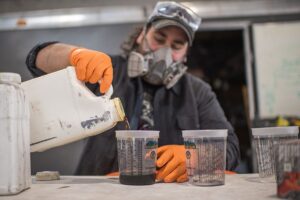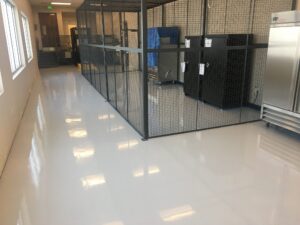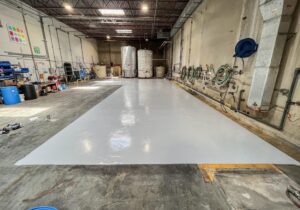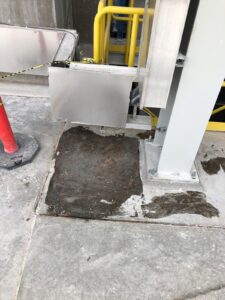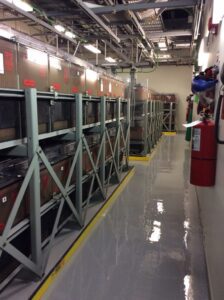BLOG
When an epoxy coating has been applied incorrectly, resolving the outstanding issues and getting your flooring fixed can often seem with a massive undertaking. You’re dealing potential bumps, lumps and bubbling all over your floor, as well as possible tacky or sticky patches and more chipping or peeling, all while still trying to run your business. You may have to clear the floor, and cease production to get this problem fixed, costing important time and money for your business. It is very difficult to fix epoxy flooring yourself. Instead, it is best to reach out to your original contractor, or have Colorado Concrete Repair come and provide the necessary repairs. How Do We Fix Epoxy Flooring? With so much having already gone wrong to get to this point, going back and redoing the entire installation, while not always cost-effective, may feel like the only choice. Repairing the epoxy coating may be possible, depending on the problems with installation. Colorado Concrete Repair will ensure a job well done with our epoxy floor installers. Fix a Crack – It is possible to […]
...READ MOREMore and more people are beginning to recognize the importance of maintaining better indoor air quality, especially in places with highly sensitive groups like nursing homes, hospitals, and those that work in enclosed areas. But what you may not realize is that your commercial flooring can have a direct effect on this air quality. That is why it is often important to choose a type of flooring that offers better air quality options. One such type of flooring is epoxy flooring. Understanding Indoor Air Quality Let’s start by talking about indoor air quality more generally. There are many things that affect air quality, from smoke to carbon monoxide to dust. With flooring in particular, we are usually talking about what are known as Volatile Organic Compounds, or VOCs. VOCs are pollutants that are introduced within the building process, either before, during, or after the build. For example: Formaldehyde Benzene Toluene Xylene These are compounds that are found in adhesives, carpeting, wood, finishes, and more. All types of flooring emit some VOCs, even epoxy, which is known as one of the […]
...READ MOREWhen you install an epoxy coating as your commercial flooring solution in a Denver business, you have an extremely durable and low maintenance floor that is suitable for a wide variety of facility types. One other requirement that commercial floors have at Denver warehouses, manufacturing plants, and other facilities may need to withstand temperature extremes. Between summer and winter in Colorado, temperatures can vary extensively and if your facility has loading bays, doors that are frequently open, or areas of the property with limited insulation, your flooring could be exposed to particularly high or low temperatures. Knowing what your epoxy can withstand will help limit any damage to your flooring. Flooring Temperature Limits for Epoxy Coatings The epoxy formulation at your property will have an effect on its resistance to extreme temperatures. During installation, if you are aware that your facility will face flooring temperature extremes, it is important to let your installer know so that they can plan an effective floor that will meet your ongoing needs. But if you are coming into a property that already has epoxy […]
...READ MOREEpoxy is a great option for properties because of its durability and resilience. When installed correctly, epoxy floors can easily last for decades as an attractive and easy to maintain floor. But when mistakes are made during installation, epoxy floor problems can exist, leaving you with a floor that is no longer suitable for your business. These are some of the ways in which epoxy often fails due to mistakes made during the installation process. Epoxy Floor Problems from Installation After your epoxy installation, you expect to have a beautiful floor that is ready to go, so it can be alarming if you begin to notice issues with the floor. Based on what you are seeing, there are a number of issues that could have caused epoxy floor problems: Small Bubbles – While epoxy is non porous, the concrete beneath it is not. These small bubbles are a result of air in the concrete base seeping out into the epoxy. This step can be avoided by sealing the concrete appropriately before applying the epoxy. Blisters or Craters – These are […]
...READ MOREEpoxy flooring can be an attractive and long lasting flooring option in an industrial or commercial property. But in order to achieve optimal flooring, epoxy prep is key. The epoxy flooring will only look as good and be as stable as its concrete base. Epoxy will not generally fix issues with a floor, so if your concrete substrate is uneven, has cracks or chips out of it, or has staining, it is necessary to repair this first before putting the epoxy in place. There are a few different methods that a flooring contractor could use to prepare an existing concrete floor for epoxy installation. How a Denver Flooring Contractor Prepares Concrete Flooring for Epoxy Installation The epoxy prep method will depend primarily on the condition of the existing floor. If your flooring contractor lays a concrete floor during the installation process, this will often need less prep than an existing floor that may have experienced damage and wear over the years. Based on the condition of the floor, a contractor can use any of the following options for preparing the […]
...READ MOREEpoxy coating is a commercial flooring option that uses the foundation of a concrete floor with a layer of durable and resistant epoxy. It is one of several resinous floor types, in addition to urethane flooring, but epoxy itself also has a variety of options. The three main types of epoxy flooring are solids-based, water-based, and solvent-based. They offer different installation processes, costs, and benefits for concrete flooring that make it possible to select the right option for all properties. Comparing the Different Epoxy Flooring Options All epoxy coatings are going to provide approximately the same appearance. They cure into a smooth and completely solid surface that is attractive. You can also customize gloss levels, textures, and colors to match the needs and design preferences of your business. The epoxy flooring options also represent some of the more cost effective floor solutions, regardless of which type you install, making it possible to achieve flooring at a reasonable cost. But the type of epoxy your contractor uses for the floor will help you further balance a reliable and stunning floor with […]
...READ MORE
